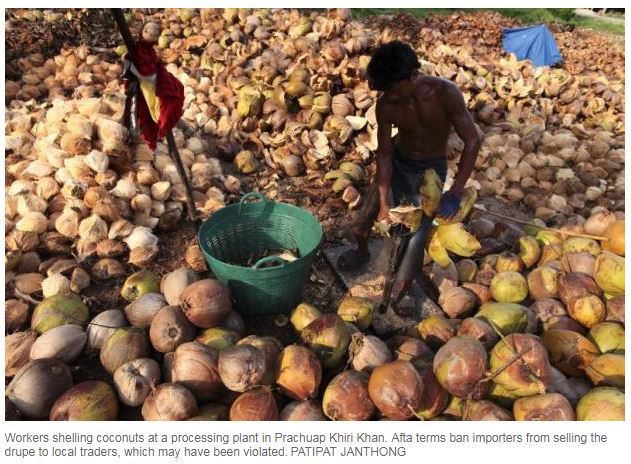Thailand: Coconut licences to be revoked
The Commerce Ministry is set to blacklist 10 coconut importers who failed to provide clarity on their import data as part of efforts to deal with the domestic coconut price slump and help protect domestic growers.
Adul Chotinisakorn, director-general of the Foreign Trade Department, said officials recently launched an inspection of 29 coconut processing factories nationwide that were awarded import licences by the department under the Asean free trade agreement (Afta). Ten importers failed to clarify their import data, avoiding further investigation.
If they refuse to clarify their import data, the department will blacklist them and temporarily revoke their import licences, said Mr Adul.
Officials suspect some importers abused their agreements and sold their imported coconuts to local traders, for which the importers hire people to remove the husks from coconut shells.
There are more than 80 coconut importers legally registered with the Foreign Trade Department that import coconut as raw materials for their factories.
The Foreign Trade Department earlier threatened to introduce sanitary and phytosanitary (SPS) measures to curb imports.
The SPS measures are meant to protect humans, animals, and plants from diseases, pests, or contaminants.
He insisted the domestic coconut price slump may not stem from the imports, citing the country had imported 195,303 tonnes of coconuts from January to August, down 27.03% from 268,672 tonnes recorded in the same period last year.
Of the total imports for the period, 167,723 tonnes were imported using Afta tariff privileges, and 27,580 tonnes were imported under the non-quota system of the World Trade Organization (WTO).
Thailand is bound by the WTO’s regulations for coconuts, under which coconut imports are allowed during January-May and November-December.
WTO tariffs allow Thailand to import 2,317 tonnes of coconuts a year.
Imports within the quota are taxed at 20% and the import tariff for non-quota trade is 54%.
Eligible importers must be juristic persons who operate factories that use coconuts as raw materials.
In 2017, Thailand’s imported coconuts totalled 416,124 tonnes worth 4.62 billion baht, 384,102 tonnes of which were from Indonesia, 15,613 tonnes from Vietnam, 2,864 tonnes from Myanmar and 13,524 tonnes from Malaysia.
Thailand is expected to produce 860,000 tonnes of coconuts this year, much lower than domestic demand, which is estimated at 1.1 million tonnes.
The country relies on imports of 241,000 tonnes in 2018.
The Office of Agricultural Economics said coconut plantations cover 1.12 million rai nationwide, with 203,461 households engaged in growing them last year.
A network of coconut farmers in Prachuap Khiri Khan recently urged the government to address the problem of falling coconut prices. They blamed imports for the price drop.
Planters in other provinces have also made complaints along the same lines.
Source: https://www.bangkokpost.com/business/news/1555062/coconut-licences-to-be-revoked


 Thailand
Thailand




